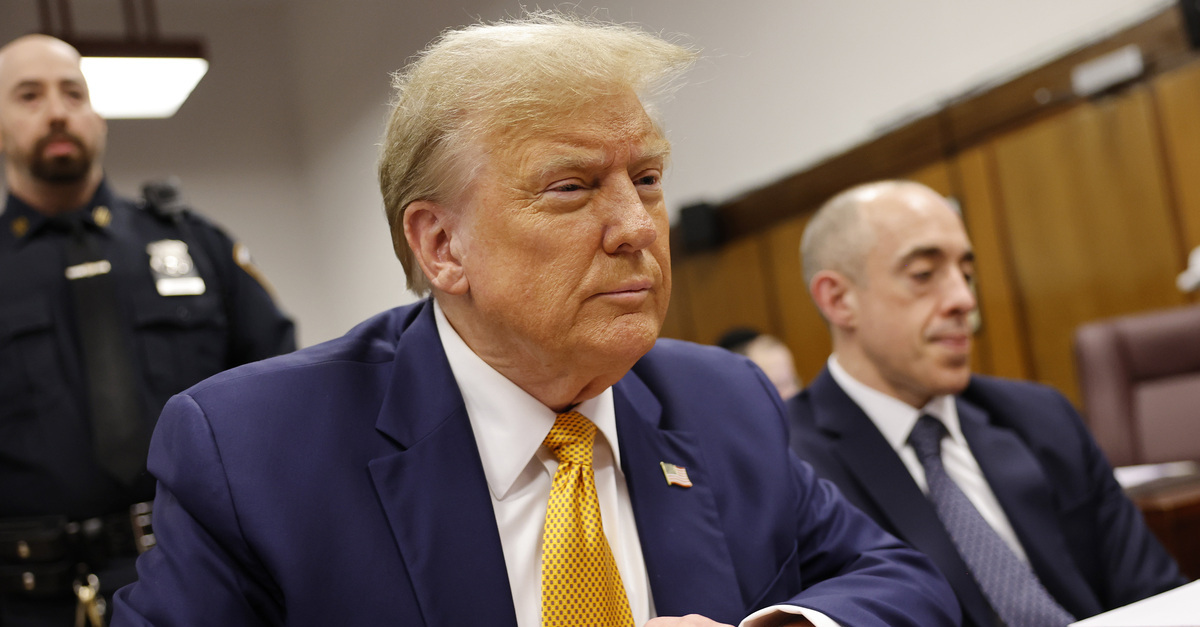
Former President Donald Trump appears at Manhattan criminal court before his trial in New York, Tuesday, May 14, 2024. (Michael M. Santiago/Pool Photo via AP)
No matter what happens in the jury room of the New York Supreme Court after upcoming deliberations later this week, Donald Trump, 77, is almost certainly not going to jail anytime soon, legal experts say.
While the hush-money case in the Big Apple is, per force, something of an historical undertaking by being the first-ever criminal trial of a former president, the nature of the crimes and the defendant himself are not likely to produce the would-be historical first instance of a former president being relegated to a jail, or much less a prison, cell.
"First of all, he's not going to jail over this," Boston University Law Professor Jed Shugerman told Law&Crime in an interview.
Several different forces are arrayed in Trump's favor that will likely keep the ex-president out of a lockup in the five boroughs – even in the event he is convicted by a jury of his far-flung Manhattan peers.
Those forces are both general and unique to him.
The charges themselves, at the basic statutory level, are relatively small bore: paper crimes about fraudulent internal business records. Typically, the allegations would be considered a misdemeanor in the Empire State, but Manhattan District Attorney Alvin Bragg upgraded them to the lowest level of felony by tying them into a purported and allegedly illegal conspiracy to influence the 2016 presidential election.
Bragg's office is not attempting to expressly criminalize the payoff to adult content creator Stormy Daniels, 45, in late October 2016.
Rather, the district attorney says the underlying crime is when Trump signed off on — personally signing in some cases — 34 different invoices, ledger entries and checks that align with the 34 alleged violations, when upgraded, of New York Penal Law Section 175.10. Those allegedly fraudulent documents all had to do with $420,000 worth of payments made to Michael Cohen, 57, throughout 2017.
The state's theory says: those frauds were attempted violations of other laws, including the Federal Election Campaign Act (FECA), and they morphed the second-degree, misdemeanor fraudulent business records offense into the first-degree, Class E felony version.
A Class E, non-violent felony is considered the least severe felony under New York law. Likely punishments for first-time offenders – which Trump would be if convicted – include no jail time at all, probation, or, a sentence of between one and four years behind bars.
"Even if we do get to sentencing, I doubt a first time offender for what's essentially an upgraded first-time offender is going to jail for this," Shugerman told Law&Crime. "Misdemeanors that are upgraded for first-time offenders don't result in jail time in New York State."
The timeline of events is likely to favor Trump.
Any given sentence will likely be stayed pending appeal, Shugerman told Law&Crime – and case the 45th president is guaranteed to exhaust the appeals process all the way up to the U.S. Supreme Court in the event of a conviction. That process, the law professor explained, would probably drag on for several months, if not years.
Shugerman said none of the considerations here – again in the event of a conviction by jury in the week or two to come – would become practical at all for at least a year due to the slow way in which the state-level appellate process would almost certainly play out.
First, Trump would need to appeal at the intermediate level, then the state's highest court, the Court of Appeals – where argument could not be scheduled until September – and then, maybe, the nation's highest court in two years or so.
"Unlikely, very unlikely that any appeal before the election," Shugerman said.
And then, there's the upcoming presidential election. All of the considerations gamed out over the New York case would become "moot" if Trump bests President Joe Biden in the 2020 re-match.
"Trump's lawyers would walk into federal court and argue that Article 2 of the Constitution has supremacy over state law and for a first-time state business records offense like this one, the state would be interfering with the president's duty to take care that the laws be faithfully executed," Shugerman said.
And if Trump loses?
In that instance, Shugerman predicted that the desire to punish Trump over the New York charges will somewhat wane and perhaps yield to the considerably more serious allegations in Georgia and the federal cases he faces in both Florida and Washington, D.C.
"There's no such thing as White House arrest," the law professor added, "There's a zero chance of jail. There's a non-zero chance of house arrest."
Other legal experts have echoed Shugerman's understanding of what the legal system in the Empire State is likely to do in the event Trump is convicted of any given crime or crimes in his hush-money case.
"It would be 'wrong' in my opinion if he gets jail time, based on how things typically work," Brian Buckmire, Law&Crime Network host and New York City-based public defender previously said.